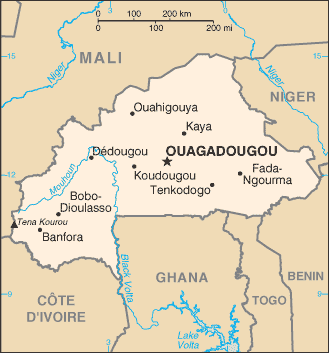Welcome to the Virtual Education Wiki ~ Open Education Wiki
Burkina Faso
author byline
Experts situated in Burkina Faso
Burkina Faso in a nutshell

Burkina Faso, also known by its short-form name Burkina, is a landlocked nation in West Africa. It is surrounded by six countries: Mali to the north, Niger to the east, Benin to the south east, Togo and Ghana to the south, and Côte d'Ivoire to the south west.
Its size is 274,000 km² with a population of more than 16.7 million (CIA July 2011 est.).
Formerly called the Republic of Upper Volta, it was renamed in 1984 to mean "the land of upright people" in Moré and Dioula, the major native languages of the country.
Burkina Faso's capital is Ouagadougou.
The country occupies the seventh to last place on the Human Development Index.
Education in Burkina Faso
Education is administrated by three ministries:
- The Ministry of Social Affairs, in charge of pre-primary education;
- The Ministry of Basic Education and Literacy, in charge of primary education, literacy
and non-formal education;
- The Ministry of Secondary, Higher Education and Scientific Research, in charge of
secondary education, higher education and scientific research.
The structure of the Burkinabè formal educational system was inherited from France.
Education has been compulsory from ages 6 to 16 since 1996. [1]
School-level education
Pre-primary Pre-primary education is open to children aged three to six, and is generally limited to the major towns.
Primary level Children enter primary education age six to seven which lasts for six years, which are subdivided into three cycles of two years each. This culminates in an exam for the primary school leaving certificate (CEP) which must be passed in order to progress to secondary education.
Secondary level Secondary education lasts a total of seven years and is divided into two cycles. The first cycle - junior high school - is a four year programme leading to an exam for the junior high school completion diploma. At this point a student may progress either to senior high school or to vocational education to train as primary school teachers, nurses, midwives, police, customs or public administration clerks. Senior high school lasts for three years ending with the secondary school leaving degree (Baccalauréat) which allows the student to progress to university.
Further and Higher education
Universities in Burkina Faso
- Libre University
- University of Ouagadougou
- University of Koudougou
Polytechnics in Burkina Faso
- The Polytechnic University of Bobo-Dioulasso, incorporating: The University Institute of Technology, which trains students in Business Administration and Secretarial Work; The Institute for Rural Development which is a college of Agriculture, Forestry, and Environmental Studies; The Higher School of Computer Sciences which provides a study program for computer software and hardware technicians.
Colleges in Country
Education reform
Administration and finance
Quality assurance
Information society
ICT in education initiatives
Derived from 2007 Infodev ICT in Education report by Babacar Fall [2]
Virtual initiatives in schools
TICE Burkina
Technologies de l'Information et de la communication pour l'Enseignement au Burkina Faso (TICE)[3] is a project aiming at providing support to integrate ICT into secondary education, funded and suppoted by the International Institute for Communication and Development (IICD). TICE's objective is to act as a guide in the process of incorporating ICT into teaching, adapted to the structure of their school. Its stated aims are:
• Improve access to ICT in high schools and junior high schools
• Build the capacities of key actors in secondary education, in the area of ICT
• Promote the integration of ICTE into teaching practices
• Support the development of local teaching content
• Promote digital culture in secondary schools
• Support initiatives to integrate ICTE in Burkina
2009 report - lessons learned from TICE-Burkina [4] and [5]
World Links Burkina Faso
World Links provides schools in developing countries with capacity building and self-sustaining computer labs, as well as programs for orientating computers into the curriculum. World Links has been working in Burkina Faso since 2001.[6] This has resulted in ten schools being equipped with an internet ready computer lab and the training of more than 300 teachers, 750 students and 60 pedagogical trainers computing, pedagogical applications of the Internet, managing collaborative projects, maintenance, network setting, ICT applied to others subjects and Web site design.
NEPAD e-Schools Initiative
The New Partnership for Africa's Development (NEPAD)